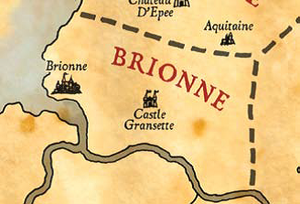"Your eyes shine like the stars, and a word from your lips is as the singing of nightingales."
- —Gilles D’Auran, Brionnian poet

Heraldry of Brionne
The Dukedom of Brionne is a founding Dukedom that lies at the southern tip of Bretonnia's western coast, just below the tranquil lands of Aquitaine. Being surronded by powerful allies and far away from major threats, Brionne is famous for its beautiful and tranquil landscape, second only to its brethren within Aquitaine itself. Indeed, for Brionne is famous for its emphasis on making everything, from mighty castles to small towns as clean and beautiful as possible.[1a]
This beauty comes at the cost of practicality and common sense. Mighty castles are beautiful in style, but horrible at its purpose. Villages are often destroyed and rebuilt all for the means of making it look beautiful and happy but at the expense of the inhabitants and the coffers of the Dukedom. Due to this emphasis, Brionne is a vibrant follower of the arts, most particular the art of literature, poetry and music, making the Dukedom a major cultural center within the kingdom. It's current ruler is Duke Theodoric.[1a]
Geography
"Why is it always stars? What’s wrong with pools of limpid water? Or jewels? But no, always stars."
- —Mauricio Casale y Gortez, Estalian poet

a map of Brionne
Brionne is the least threatened of the Bretonnian dukedoms. Carcassonne stands between it and the mountains, Quenelles between it and Athel Loren, and Aquitaine between it and the Forest of Châlons. Even the seas off the coast are forgiving. Most of Brionne is arable land, with some pastoral land in the east and south. The coast is typical of Bretonnia’s cliffs and beaches, and there is a major natural port at the mouth of the River Brienne. The city of Brionne is built here, shining like a jewel set in silver, as entirely too many poets have said. Like Brionne itself, the castles and towns of Brionne are built for beauty rather than practicality. Many nobles have built keeps so as to harmonise with the landscape, but in completely indefensible positions.[1a]
Brionnian fortifications often have large windows and seats that are ideal for listening to lays but less useful for defence. Castle towers are often confections of white stone that are too small for a bowman, let alone a siege engine. Villages are also designed to be picturesque. This is difficult, as peasants insist on living there and making the place dirty. It is not uncommon for Brionnian nobles to tear down all the houses in a village and have them rebuilt in accordance with some vision of what a happy village should look like. This rarely makes any concessions to practicality. Indeed, a few lords forbid their peasants from carrying out any activities that might dirty the village and require them to wash before entering.[1a]
This makes life impossible, so a shantytown generally grows up behind the nearest hill, where the lord cannot see it when he comes to inspect his lands. Plagues, rather than monsters, are the curse of Brionne. Nobody really understands the reasons, though ducal physicians have written learned tomes on the subject. Every year or so, a new disease rips through some part of Brionne. It brings suffering and death to hundreds, nobles and peasants alike, and then it vanishes as suddenly as it appeared, never to be seen again. Occasionally cultists of Nurgle are found and held responsible, but sometimes no plausible cause is forthcoming.[1a]
The People
The Brionnians say everyone born in their dukedom is born a poet. Residents of other dukedoms say everyone in Brionne is born thinking he’s a poet. Poetry and courtly love are as important to the Brionnian nobility as prowess in battle, and even many of the peasants catch the mood. The classic form of courtly love is laid down in such poems as Clovis and Ermengild and The Horn of Franez. A young Knight Errant falls in love with the young and beautiful wife of an older noble. The lady at first refuses to acknowledge him, so the knight performs great feats of valour to draw her attention. At length they meet in a beautiful tower with a view over a garden, and the lady declares the knight has won her heart. The knight, however, declares he could not betray the noble lord, her husband, and leaves on a quest for the Grail.[1a]
The lady pines, sustained only by the stories of her lover’s prowess, until he returns, as a Grail Knight, shortly after the lady’s husband dies. They marry in a glorious ending to the story. Whilst some knights are content to just tell these stories, most want to live them. This is not popular with older husbands of young and beautiful wives, as these men are generally not interested in conveniently dying just before the climax of the story. Adultery is the least of the problems arising: feuds, attempted assassinations, and all-out war are common. Many Brionnian adventurers have left the dukedom because of problems arising from their pursuit of courtly love. Often, this means her husband found out, but since deeds of prowess are an important part of the process even successful lovers may set out.[1a]
Others, of course, leave Brionne to get away from all that nonsense. The internal politics of the dukedom are even more personal than elsewhere. There are numerous rivalries, feuds, and alliances, but most are based on the repercussions of courtly love. Apart from the obvious feuds between husbands and lovers, there are feuds between rival lovers of the same lady, ladies who want the same knight, minstrel-knights jealous of each other’s fame, and between completely untalented wannabe minstrel-knights and everyone with a touch of musical taste. Mundane issues like land and wealth are almost never an issue.[1a]
